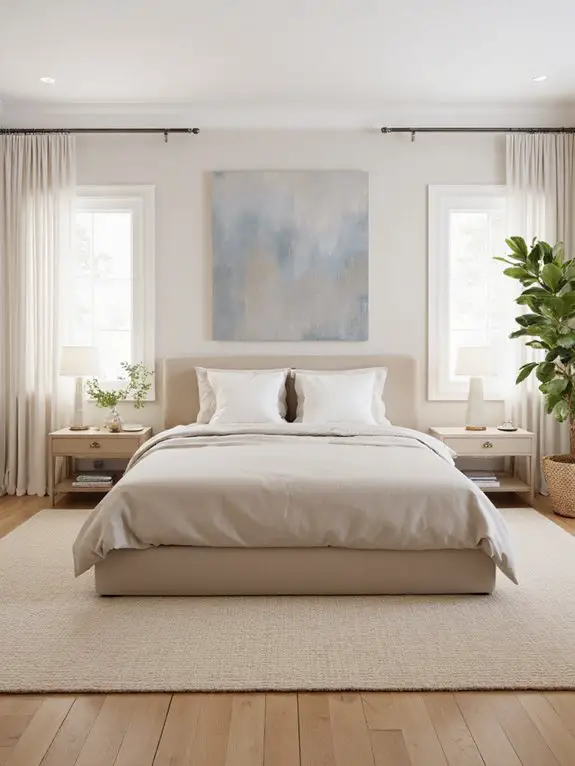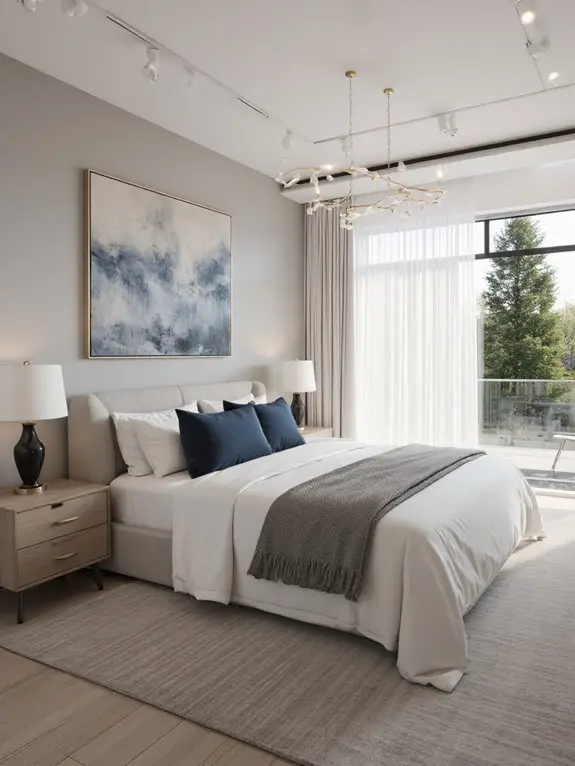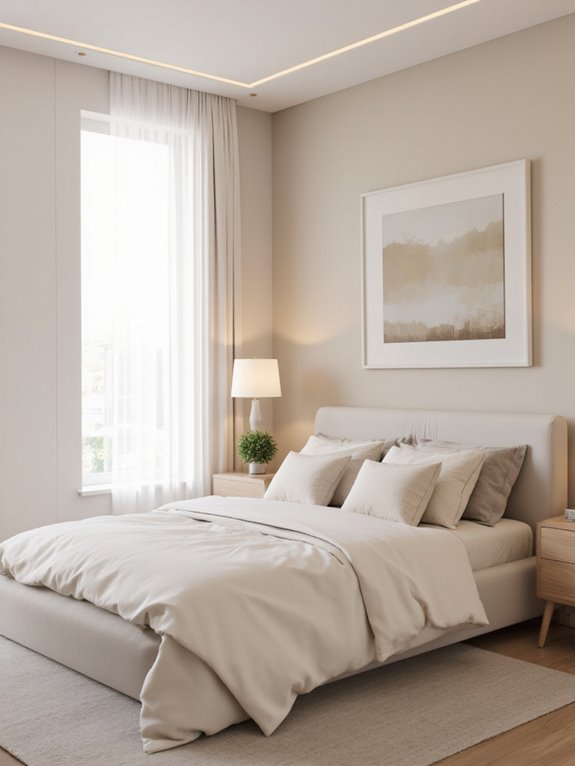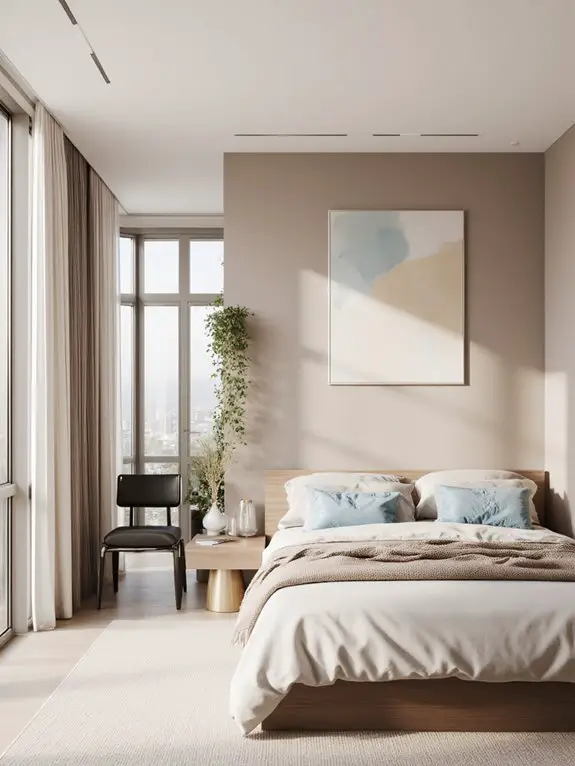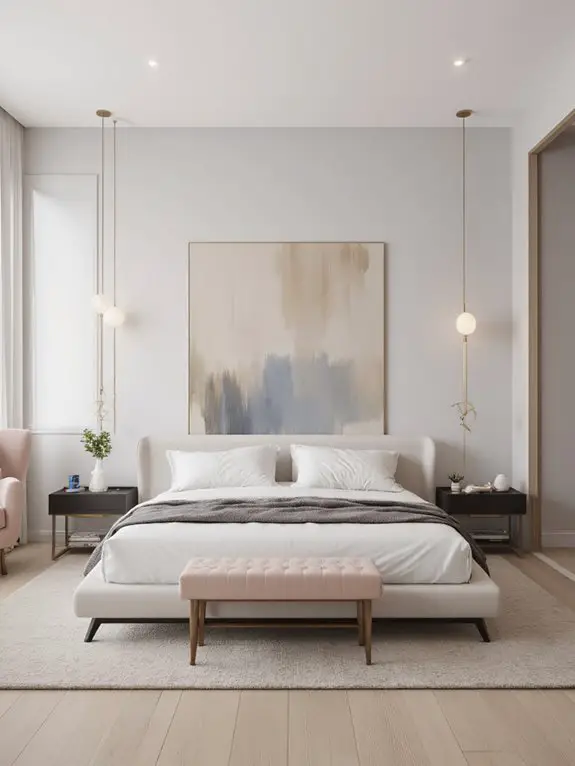To create a master bedroom that aligns with feng shui principles, I start by positioning the bed diagonally opposite the door for a commanding view and placing it against a solid wall. I choose a sturdy headboard and calming colors like soft blues or greens. Symmetry is key, so I balance the room with matching nightstands and lamps. I keep the space clutter-free and guarantee proper airflow for positive energy. These steps set the foundation for a serene retreat, and there’s more to explore beyond these basics.
Choose the Right Bed Placement
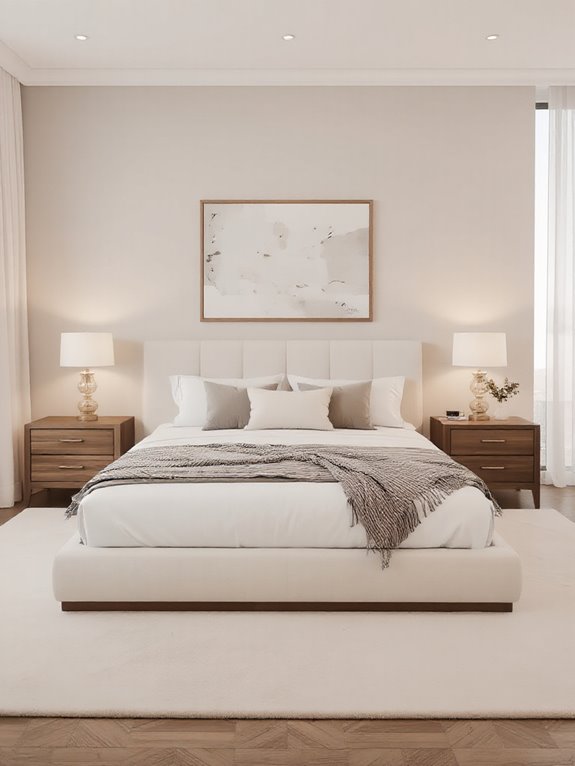
When deciding where to position your bed, it’s essential to evaluate both comfort and Feng Shui principles. I always recommend placing the bed diagonally opposite the door, giving a clear view of the entrance without being directly in line with it—this is known as the “command position.” It creates a sense of security and control.
Avoid positioning the bed under a window or with feet facing the door, as these layouts can disrupt energy flow and feel unsettling. I also suggest keeping the bed away from sharp corners or beams overhead, which can generate negative energy.
A balanced, grounded placement guarantees restful sleep.
Opt for a Solid Headboard

Although it might seem like a minor detail, choosing a solid headboard can substantially impact the energy and comfort of your bedroom. In feng shui, a sturdy headboard symbolizes support and stability, which helps create a sense of security and grounding.
I always recommend selecting one made of solid wood or upholstered fabric, as these materials provide both strength and comfort. Avoid headboards with spindles or open designs, as they can disrupt the flow of energy.
Positioning the headboard against a solid wall further enhances this effect, ensuring you feel protected and at ease while you rest.
Use Calming Colors
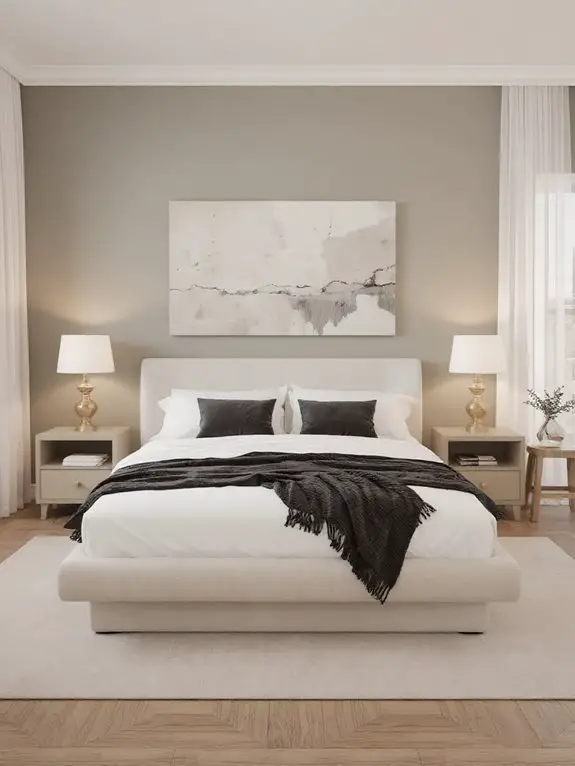
Calming colors in your bedroom can markedly influence your mood and energy levels. I recommend choosing soft, muted tones like pale blues, gentle greens, or warm neutrals such as beige or light gray.
These hues create a serene atmosphere, helping you unwind and promoting restful sleep. Avoid overly bright or bold colors, as they can feel stimulating and disrupt relaxation.
When selecting your palette, consider the natural light in your room—softer shades work well in well-lit spaces, while slightly warmer tones can balance darker areas.
Balance the Room With Symmetry
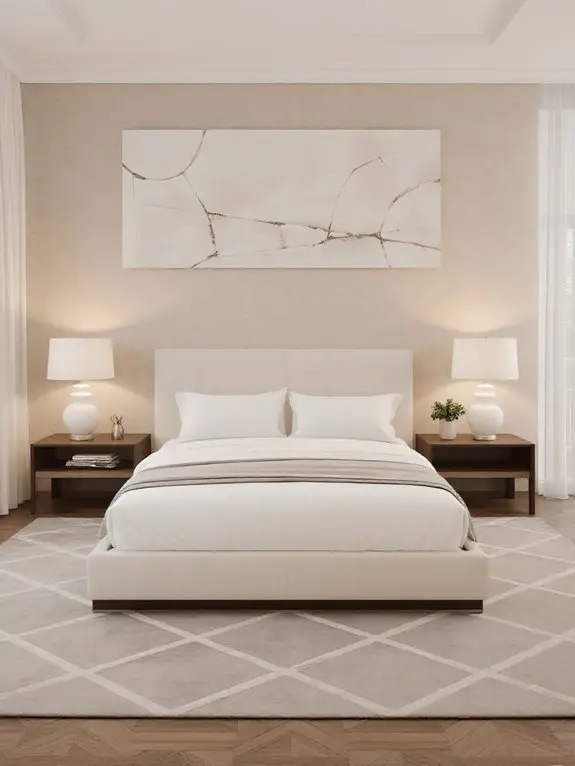
To create a harmonious and balanced bedroom, I recommend focusing on symmetry in your layout and decor. Symmetry mimics nature’s balance, promoting calm and stability.
Start with your bed—center it on the wall and flank it with matching nightstands and lamps. Avoid placing one side higher or lower than the other.
If you use artwork, hang a pair of identical pieces or one large centered piece above the bed. Even furniture placement matters; confirm chairs, dressers, or benches are evenly distributed.
This deliberate arrangement not only enhances the room’s energy flow but also creates a visually pleasing, restful environment.
Keep the Space Clutter-Free
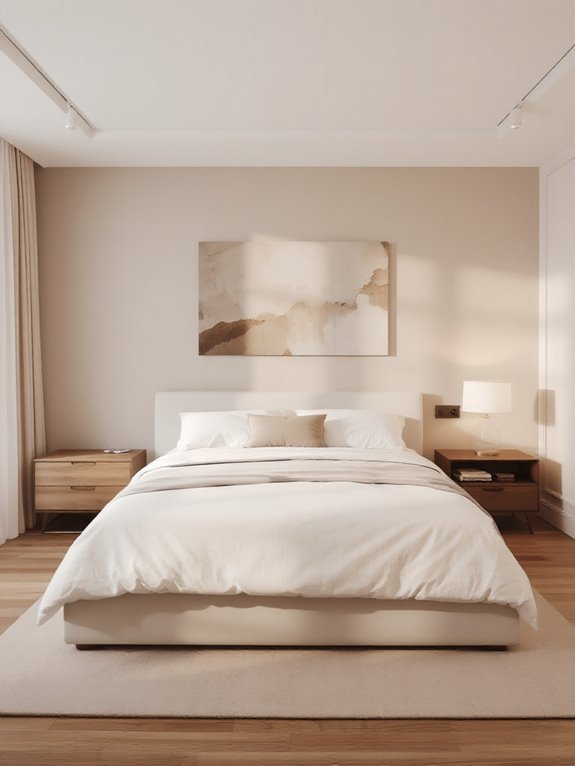
Since a clutter-free bedroom is crucial for promoting tranquility and positive energy, I’ll share practical steps to achieve this.
Start by clearing items from under the bed, as stored objects can disrupt the flow of chi.
Organize nightstands, keeping only essentials like a lamp, book, or alarm clock.
Store clothes in closed drawers or closets to avoid visual chaos.
Regularly declutter items like old magazines, unused electronics, or unnecessary decor.
Use baskets or bins for small items to maintain order.
A clean, open space allows energy to circulate freely, fostering relaxation and balance, which are indispensable for restful sleep.
Add Soft, Layered Lighting
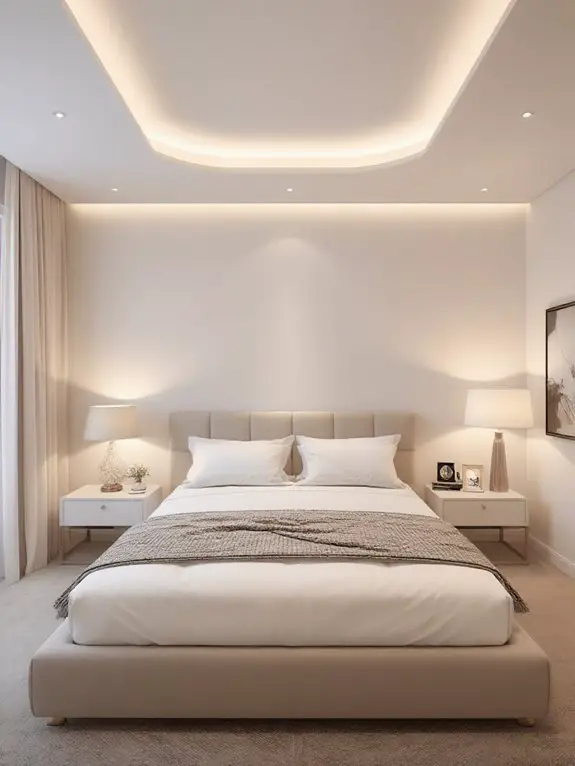
While lighting plays a pivotal role in setting the mood of a bedroom, soft, layered lighting can transform the space into a serene retreat. I recommend combining ambient, task, and accent lighting to create balance.
Start with a dimmable overhead light for flexibility, then add bedside lamps for reading. Warm-toned bulbs (2700K-3000K) promote relaxation, while fairy lights or wall sconces add gentle accents.
Avoid harsh, direct light—it disrupts the room’s harmony. Layer sources at different heights to mimic natural light’s flow. This approach not only enhances Feng Shui but also supports restful sleep by easing shifts between activities.
Incorporate Natural Elements
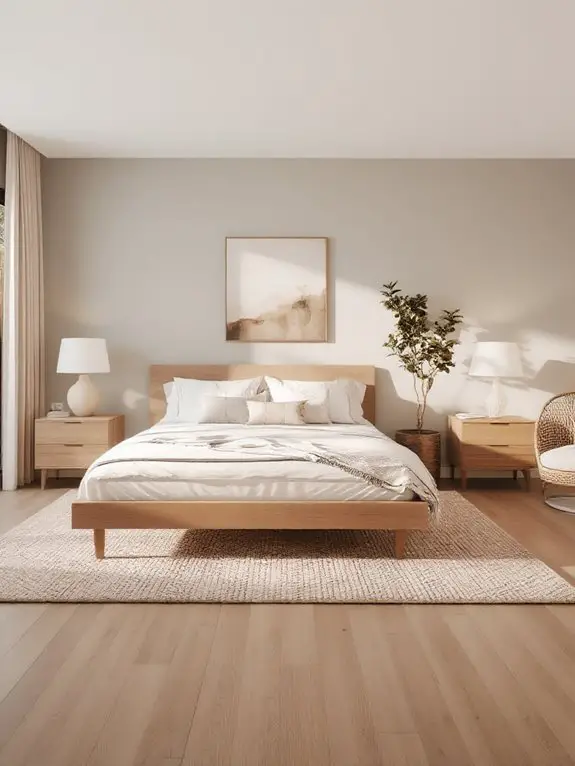
Incorporating natural elements into your bedroom can markedly enhance its Feng Shui by fostering a sense of calm and connection to the outdoors. I recommend starting with houseplants like peace lilies or snake plants, which purify the air and add life to the space.
Wooden furniture or accents, such as a bedside table or a rustic headboard, bring warmth and grounding energy. Natural fabrics like cotton or linen for curtains or rugs also contribute to a serene atmosphere.
Don’t forget to let in natural light during the day, as it invigorates the room and supports a balanced energy flow.
Use High-Quality Bedding
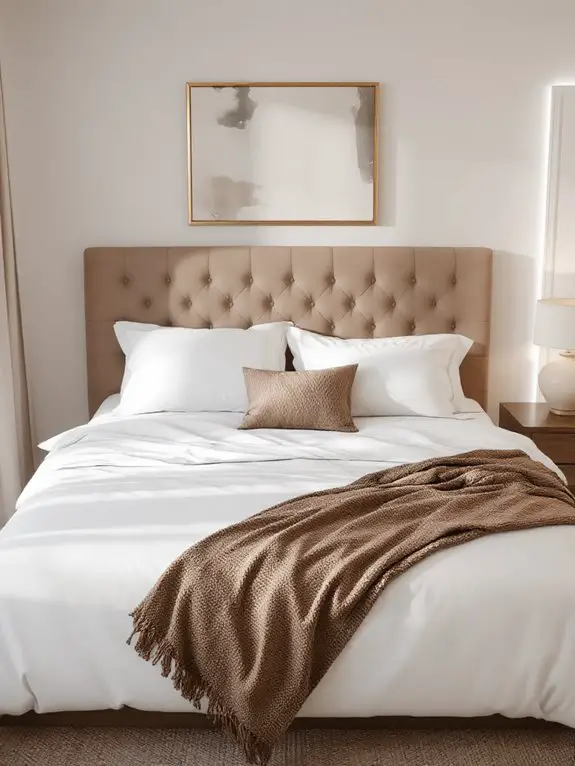
High-quality bedding plays a pivotal role in optimizing the Feng Shui of your bedroom, as it directly influences your comfort and the energy of the space.
I always recommend investing in natural fabrics like cotton, linen, or bamboo, as they promote breathability and relaxation.
Opt for soothing colors that align with your desired energy—soft neutrals for calm, or warmer tones for passion.
Confirm your sheets, blankets, and pillows are soft, durable, and free from synthetic materials that can disrupt sleep.
A well-made mattress is equally essential, as it supports your body and aligns your energy. Together, these elements create a harmonious, restorative environment.
Position the Bed Away From Doors
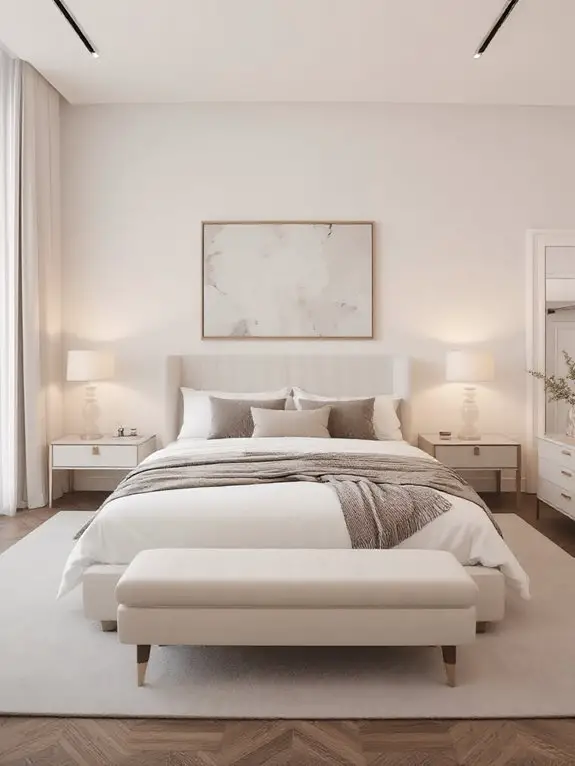
When arranging your bed, it’s crucial to place it away from doors to maintain a sense of security and balance in the room. I always avoid aligning the bed directly with the doorway, as this can create a feeling of vulnerability and disrupt energy flow.
Ideally, the bed should be positioned diagonally across from the door, allowing me to see who enters while feeling protected. If space is limited, I use a room divider or tall furniture to create a barrier.
This setup fosters relaxation and guarantees I’m not in the direct path of incoming energy.
Avoid Mirrors Facing the Bed
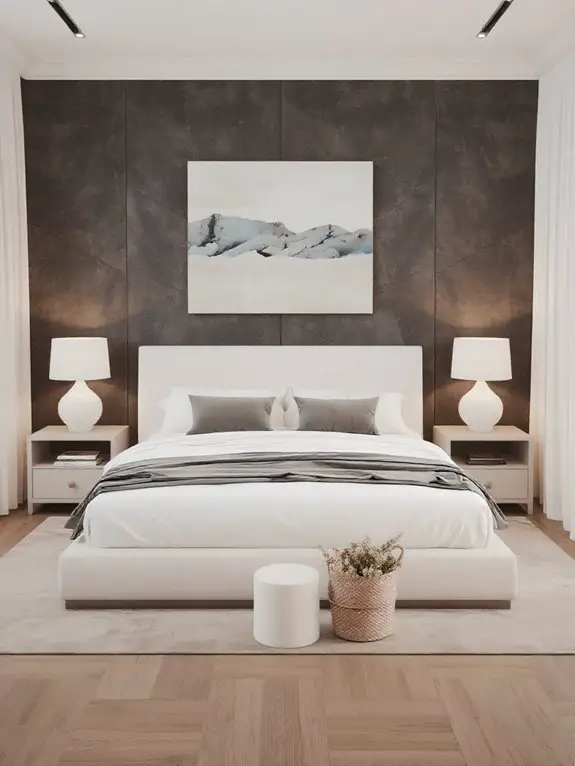
Although mirrors can enhance a room’s aesthetic, I avoid placing them directly facing the bed because they’re believed to disrupt sleep and create unsettling energy. Feng Shui teaches that mirrors reflect energy, and when positioned opposite the bed, they can bounce that energy back, making it difficult to rest deeply.
I also find that seeing my reflection at night can feel startling or distracting, especially when waking up. If I’ve a mirror in the bedroom, I place it on a side wall or closet door instead. Covering a mirror at night is another simple solution to maintain a calm, restful space.
Create a Clear Path to the Bed
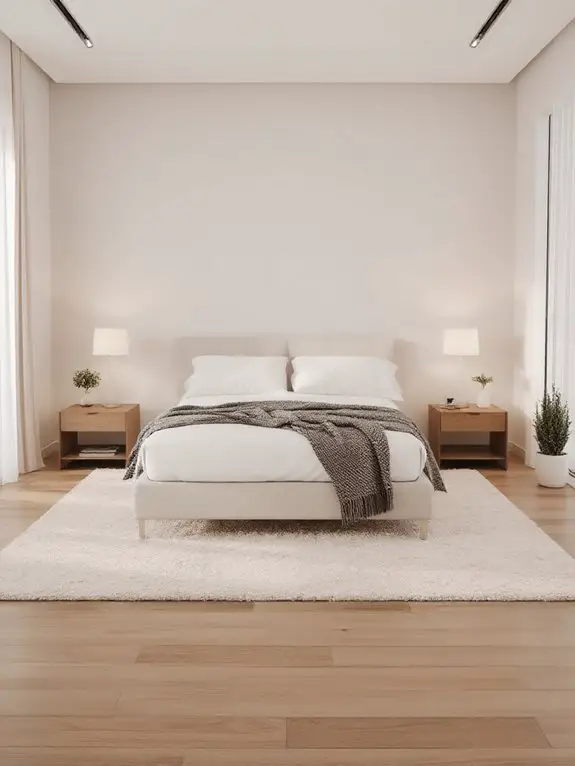
In addition to avoiding mirrors facing the bed, ensuring a clear path to the bed is another key aspect of bedroom Feng Shui. I’ve found that clutter or obstacles around the bed can disrupt the flow of energy, making relaxation difficult.
Keep furniture like chairs or nightstands accessible but not obstructive. I always make sure there’s enough space to walk comfortably on both sides of the bed, as this promotes balance and equality in relationships.
A clear path also symbolizes ease and openness in life, helping me feel more at peace when I enter or leave the bedroom.
Use Soothing Artwork
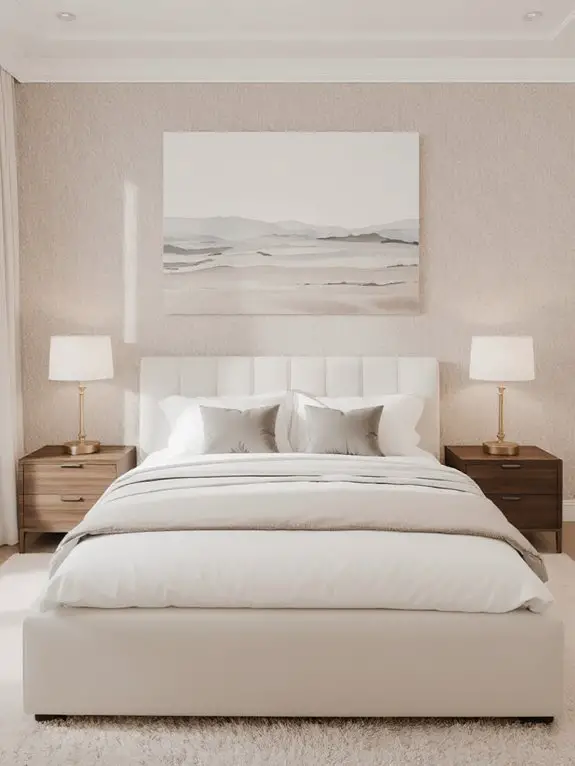
Incorporating soothing artwork into my bedroom has been a game-changer for enhancing the overall Feng Shui and creating a calming atmosphere. I choose pieces that evoke serenity, like nature scenes, abstract designs in muted tones, or soft watercolors.
Avoid chaotic or aggressive imagery, as it can disrupt the room’s energy. I also verify the artwork aligns with the bedroom’s purpose—rest and relaxation—by keeping themes peaceful and uplifting.
Proper placement is key; I hang art at eye level and avoid crowding walls. This thoughtful approach not only beautifies the space but also fosters a tranquil environment, promoting better sleep and emotional balance.
Incorporate Air-Purifying Plants
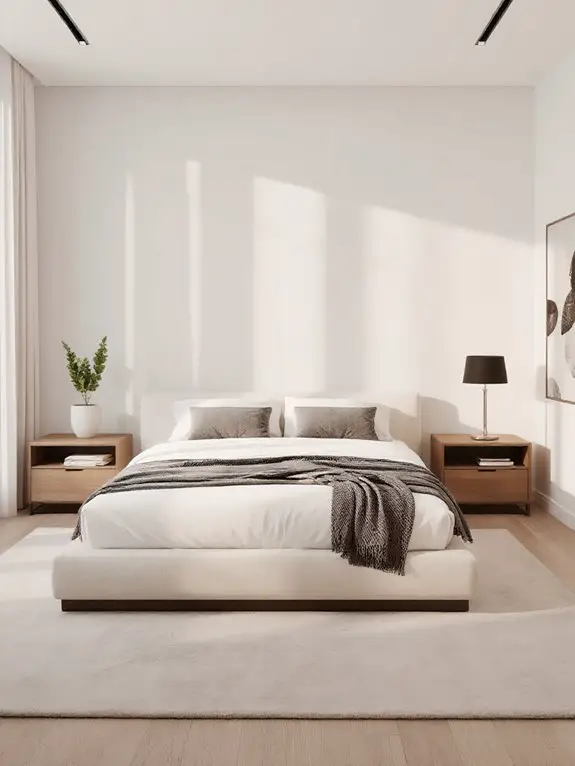
Adding air-purifying plants to my bedroom has distinctly enhanced both the air quality and the room’s Feng Shui energy. Plants like snake plants, peace lilies, or aloe vera not only filter toxins but also introduce vibrant life force, or *chi*, into the space.
I place them in corners to soften sharp edges or near windows to maximize natural light exposure. It’s important to avoid overcrowding; one or two well-chosen plants are enough to create balance.
Keeping them healthy and dust-free guarantees they remain effective and energetically positive. This simple addition has made my bedroom feel fresher and more harmonious.
Choose Wooden Furniture
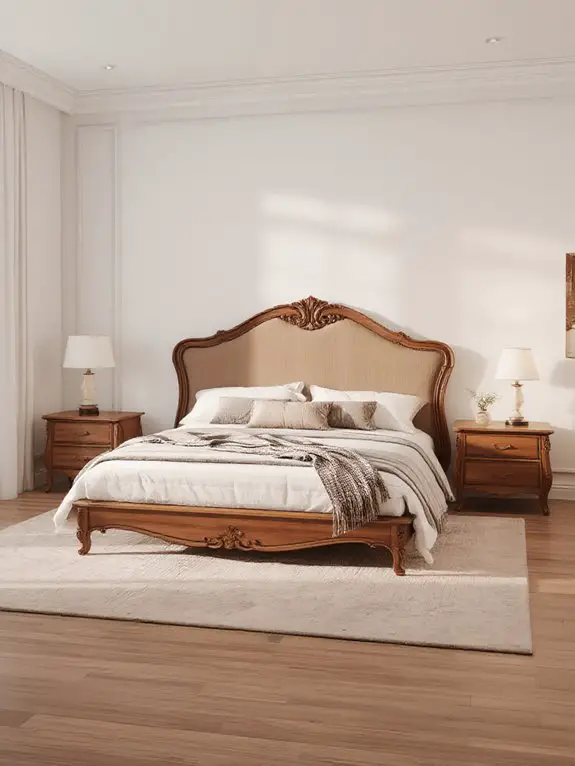
Since wooden furniture aligns naturally with Feng Shui principles, it’s become a cornerstone of my bedroom design. Wood symbolizes growth, stability, and warmth, making it ideal for creating a harmonious space.
I’ve opted for solid, well-crafted pieces like a wooden bed frame or nightstand, as they ground the room’s energy. Lighter woods like oak or maple foster a calming vibe, while darker tones like mahogany add depth and richness.
I avoid veneers or synthetic materials, as they disrupt the natural flow of chi. Incorporating wooden furniture has transformed my bedroom into a serene retreat, perfectly balanced for rest and rejuvenation.
Avoid Overhead Beams
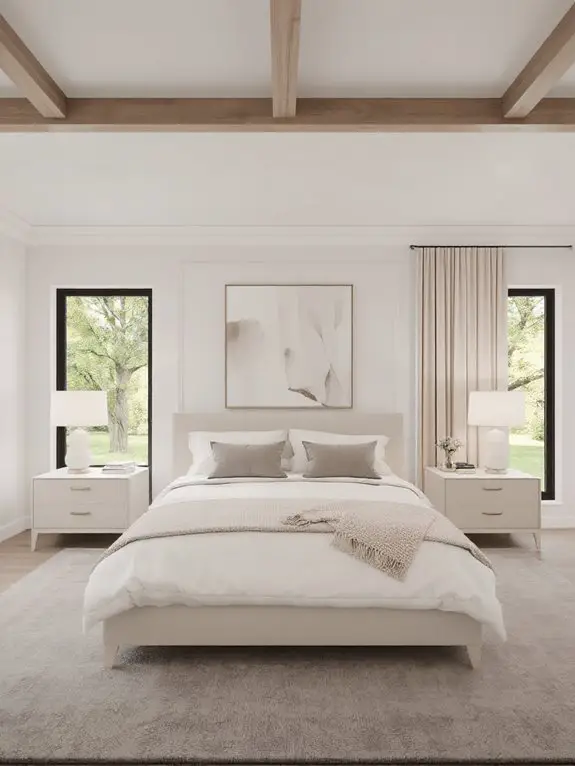
While overhead beams can add architectural interest to a room, they’re often problematic in Feng Shui because they create oppressive energy.
I’ve found that sleeping or sitting directly beneath them can lead to feelings of pressure and stress, disrupting the flow of positive Chi. To counter this, I recommend positioning the bed or seating area away from beams whenever possible.
If they can’t be avoided, I suggest softening their effect by hanging fabric, installing a false ceiling, or painting them the same color as the ceiling to make them less dominant. These adjustments help maintain a serene and balanced atmosphere.
Keep Electronics to a Minimum
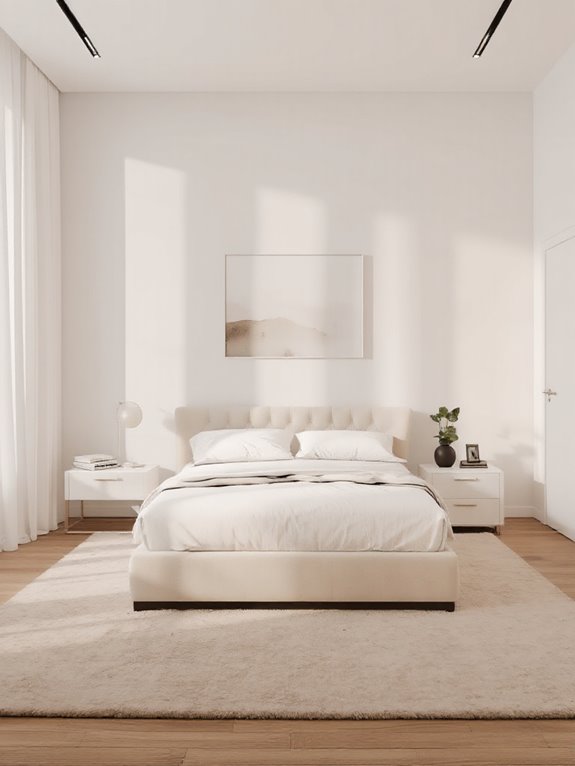
Electronics in the bedroom can substantially disrupt the flow of Chi, creating energetic interference that affects both sleep quality and overall harmony. I recommend minimizing devices like TVs, laptops, and smartphones, as their electromagnetic fields and constant notifications can overstimulate the mind and disturb rest.
If you must have electronics, keep them out of sight, preferably in a cabinet or drawer, and turn them off at night. Charging stations should be placed in another room to avoid a buildup of stagnant energy.
Use Soft, Natural Fabrics
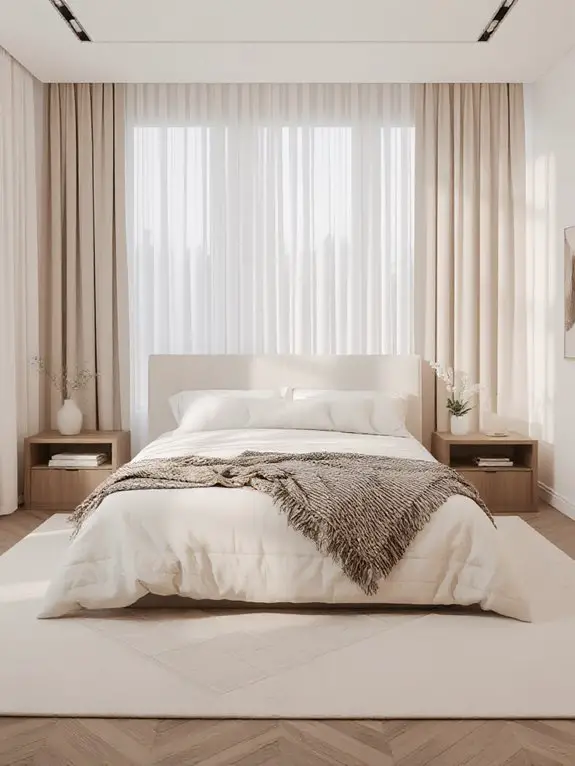
Incorporating soft, natural fabrics into your bedroom can markedly enhance the soothing energy of the space. I recommend choosing materials like organic cotton, linen, or silk for bedding, curtains, and upholstery, as they promote breathability and comfort.
These fabrics align with Feng Shui principles by fostering a connection to nature and creating a serene atmosphere. Avoid synthetic materials, which can trap energy and disrupt the flow of qi.
Opt for neutral or earthy tones to maintain balance and harmony. By surrounding myself with these textures, I’ve noticed a significant boost in relaxation and the overall calming energy of my bedroom.
Add a Pair of Nightstands
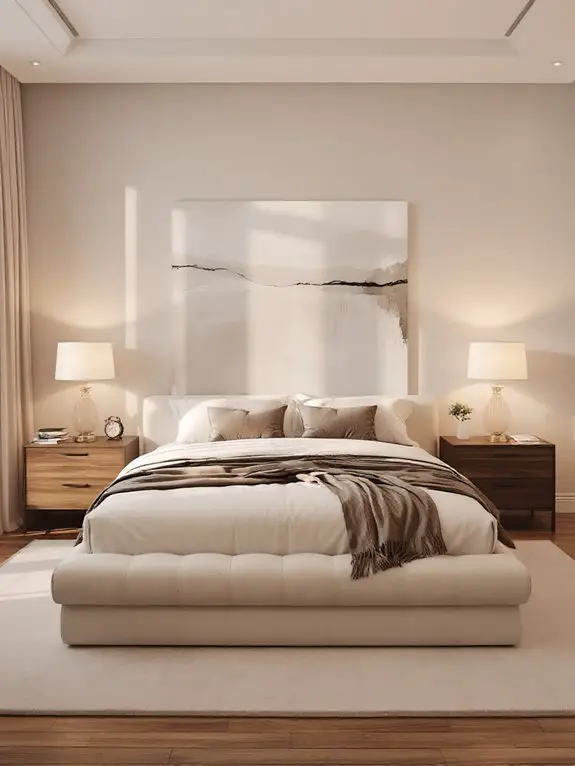
To create a balanced and harmonious bedroom layout, I always recommend adding a pair of nightstands on either side of the bed. This practice guarantees symmetry, which is a core principle of Feng Shui, promoting equality and partnership in relationships.
Choose nightstands of equal height and size to maintain equilibrium. They provide practical storage for essentials like books, water, or a lamp, keeping the space clutter-free.
Position them close enough to the bed for easy access but leave some breathing room between them and the mattress. This setup fosters a sense of stability and support in your sleep environment.
Choose Rounded Furniture Edges
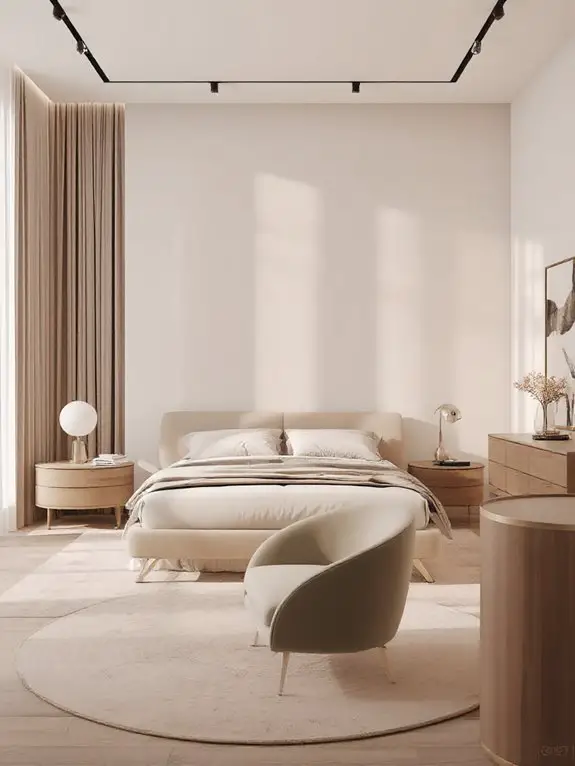
When arranging furniture in a Feng Shui bedroom, I suggest opting for pieces with rounded edges rather than sharp corners. Sharp edges, or “poison arrows,” are believed to disrupt the flow of chi, creating energetic tension and discomfort.
Rounded furniture, on the other hand, promotes a sense of harmony and safety, making the space feel more inviting. I recommend choosing a bed frame, nightstands, or chairs with soft curves to enhance relaxation.
This subtle adjustment not only aligns with Feng Shui principles but also reduces the risk of physical injury, ensuring your bedroom feels both calming and functional.
Introduce Aromatherapy Elements
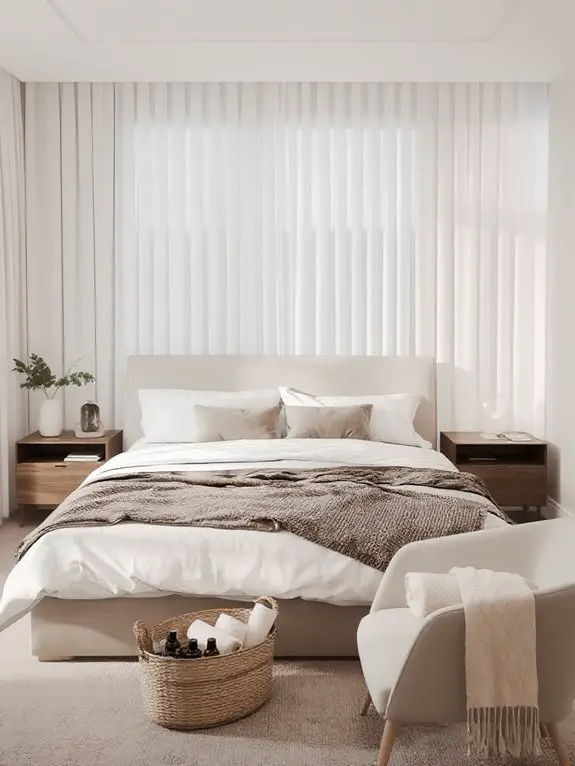
Since scents can profoundly influence mood and energy, I recommend adding aromatherapy elements to your Feng Shui bedroom for a more balanced atmosphere.
Opt for essential oils like lavender, chamomile, or sandalwood, which promote relaxation and tranquility. Use a diffuser to disperse these scents evenly, ensuring they don’t overwhelm the space.
Place natural elements like dried herbs or citrus peels in a decorative bowl for a subtle, earthy fragrance. Avoid synthetic air fresheners, as they can disrupt the natural flow of energy.
Experiment with scents that resonate with you, creating a personal sanctuary that supports rest and rejuvenation.
Use Soft, Curtains or Blinds
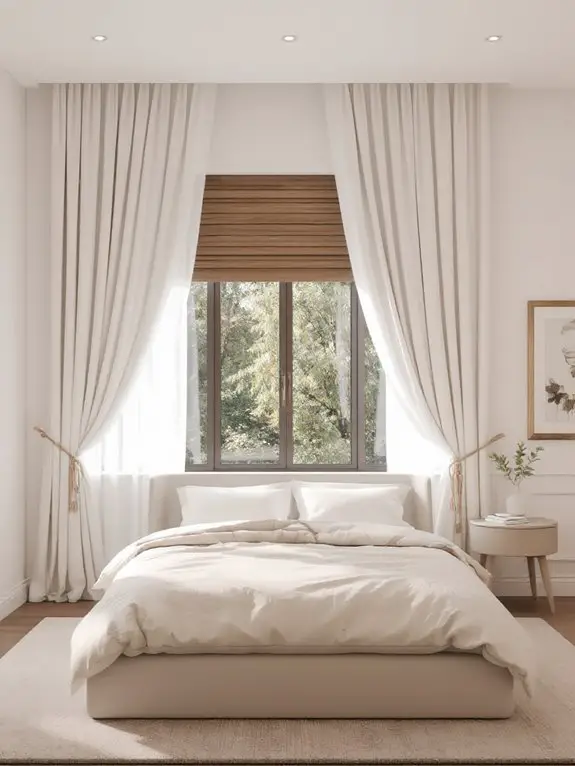
While natural light is essential for a balanced Feng Shui bedroom, harsh sunlight can disrupt the room’s calming energy. I always recommend using soft, flowing curtains or adjustable blinds to control the light.
Heavy drapes or dark shades can block too much light, creating a stagnant atmosphere. Instead, opt for light, breathable fabrics like cotton or linen in soothing colors to filter sunlight gently. This softens the energy and promotes relaxation.
I also suggest ensuring the curtains open fully during the day to invite positive chi, then close them in the evening to create a cozy, restful environment for sleep.
Position the Bed for a Commanding View
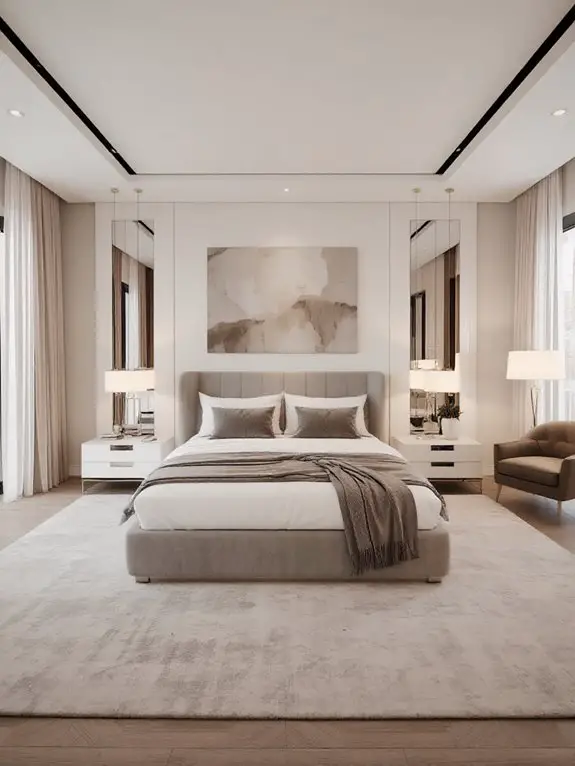
Placing your bed to achieve a commanding view is one of the most effective ways to enhance the Feng Shui of your bedroom. I always recommend positioning the bed so you can see the door while lying down but aren’t directly in line with it. This creates a sense of security and control, which is essential for restful sleep.
Avoid placing the bed under a window or in a corner where one side is against a wall, as this can disrupt energy flow. Ideally, there should be equal space on both sides of the bed to promote balance and harmony in the room.
Avoid Water Features in the Bedroom
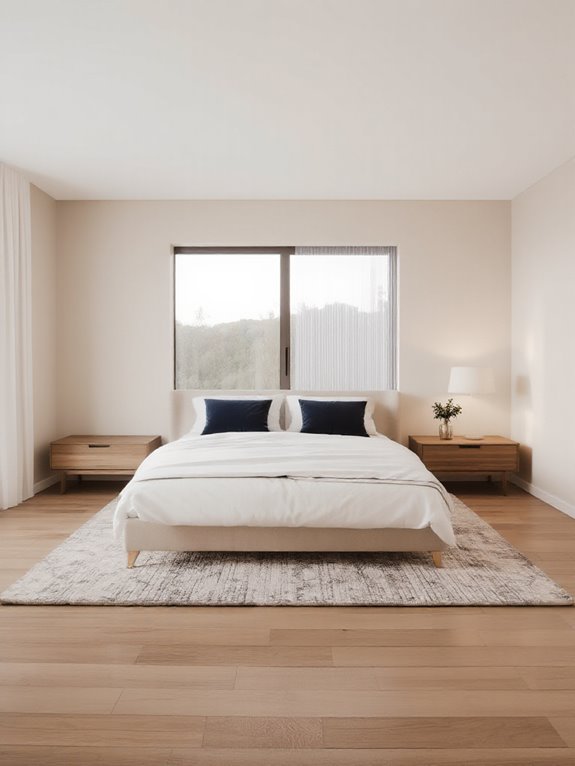
To maintain balanced energy in your bedroom, I strongly advise against incorporating water features such as fountains, aquariums, or even large paintings of water scenes. In Feng Shui, water symbolizes movement and flow, which can disrupt the calm, restful atmosphere essential for sleep. Its active energy may lead to restlessness or emotional instability, making it harder to unwind.
Additionally, water features can introduce excess moisture, potentially harming air quality and promoting mold growth. Instead, focus on grounding elements like soft textiles or soothing colors to create a serene environment. A bedroom should feel like a sanctuary, not a source of distraction.
Incorporate Personal Touches
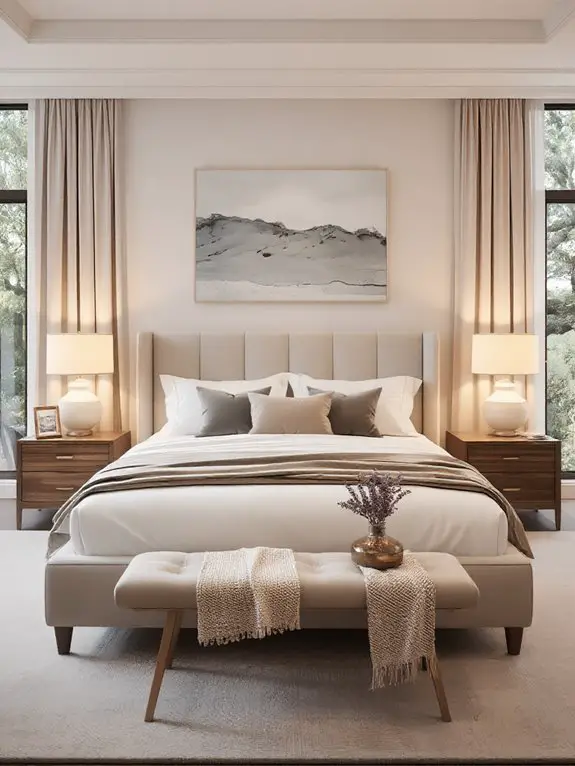
Since your bedroom should reflect who you are, incorporating personal touches is key to making the space feel truly yours. I always recommend adding items that bring you joy, like family photos, artwork, or meaningful decor.
Choose colors that resonate with your personality and create a calming atmosphere. Display objects that hold sentimental value, such as a cherished keepsake or a favorite book.
Keep these items organized to avoid clutter, as Feng Shui emphasizes harmony. Your bedroom should feel like a sanctuary, so trust your instincts and surround yourself with things that make you feel grounded, happy, and at peace.
Ensure Proper Airflow and Ventilation
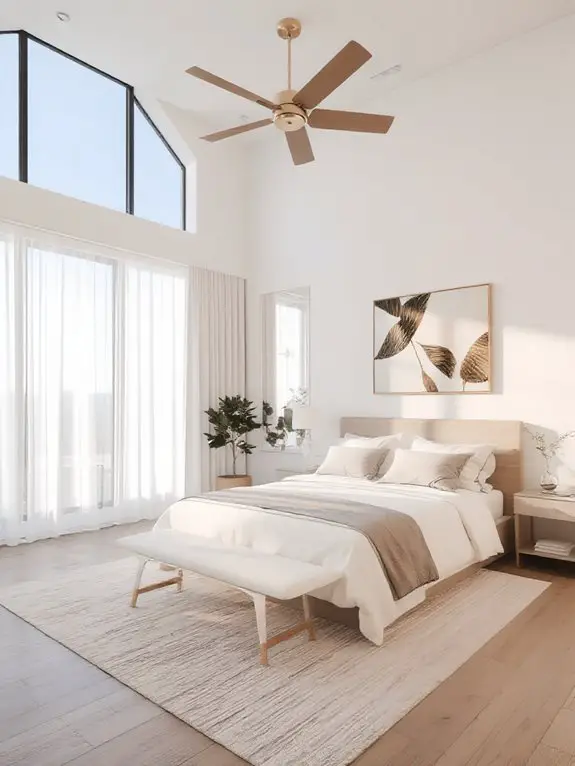
While creating a peaceful and harmonious bedroom environment, it’s essential to confirm proper airflow and ventilation. I always make sure my windows can open fully to let fresh air circulate, as stagnant energy can disrupt sleep and overall well-being. If windows aren’t an option, I use a quality air purifier or fan to keep the air moving.
I also avoid cluttering under the bed, as it can block energy flow and reduce air circulation. Plants like aloe vera or peace lilies help naturally purify the air, but I keep them limited to avoid excess moisture. Fresh, clean air is crucial for restful energy.
Frequently Asked Questions
Can Feng Shui Improve My Sleep Quality?
I’ve heard feng shui can improve sleep quality by creating a balanced, calming space. Simple changes like decluttering, positioning my bed for support, and using soft, natural colors might help me feel more relaxed and rest better.
Is It Okay to Have a TV in the Bedroom?
Think of your bedroom as a sacred cocoon, meant for rest and connection. A TV can feel like an intruder, buzzing with distractions. If it stays, I’d suggest hiding it when not in use to reclaim serenity.
How Does Feng Shui Affect Relationships in the Bedroom?
I believe Feng Shui can deeply influence relationships in my bedroom by creating harmony and balance. I’d arrange furniture to promote connection, remove clutter for clarity, and incorporate calming colors to nurture intimacy and strengthen emotional bonds.
Can I Use Crystals for Feng Shui in the Bedroom?
‘Tis a notion from ages past, but I’d say crystals can absolutely enhance feng shui in the bedroom. I’d place rose quartz for love or amethyst for calm, ensuring they’re positioned with intent to amplify their energy.
What Should I Avoid Placing Under the Bed?
I’d avoid placing clutter, like shoes or boxes, under the bed because it disrupts energy flow and feels chaotic. Keeping it clear creates a sense of calm and allows for better rest and relaxation.

